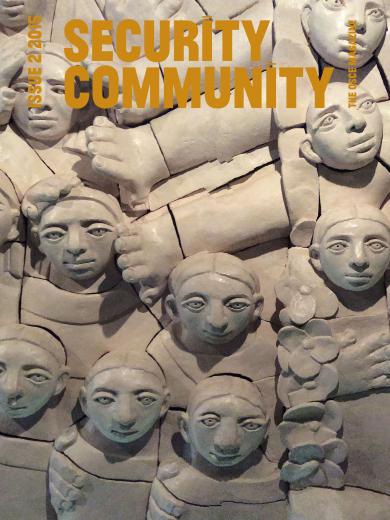Moving on Climate Change - In Conversation with Jeffrey Sachs
Climate change used to be considered a “threat multiplier”, it is now a “threat catalyst”[1], said Guardian journalist Suzanne Goldenberg, speaking at the Security Day “Climate Change and Security - Unprecedented Impacts, Unpredictable Risks” hosted by Secretary General Lamberto Zannier in Vienna on 28 October 2015.
No one denies any more that climate change impacts security. The question panelists at the OSCE event tried to answer was: What can an organization like the OSCE do?
“To my mind, the OSCE has an extremely pertinent role to play,” said Jeffrey D. Sachs, Director of The Earth Institute, speaking via webcast with Secretary General Zannier. Here are excerpts from their conversation:
Lamberto Zannier: The approach we have to security in the OSCE area is based on soft security and confidence building; would such an approach be able to help to overcome energy nationalisms, for instance?
Jeffrey Sachs: I think it’s essential. Doing this partly by shorter term measures of trust and confidence and partly by an OSCE-wide engagement in low carbon energy security would be extremely valuable, because if you did OSCE-wide planning then the inter-dependencies of the different regions would become clearer.
We constantly in everyday life and in all of the security issues that you face are at a choice between confrontation and co-operation. And, of course, the OSCE is built on the concept that co-operation is the positive sum approach to all of this, which I think is the fundamental truth for us. If we end up in any kind of new Cold War on the Ukraine border or in the South China Sea, we’re never going to solve these problems of sustainable development.
The local level is where the impact of climate change is felt the most. Do you see room for bottom-up approaches involving civil society?
I think one thing that is extremely important is for people everywhere to understand what the vulnerabilities are, not only in general terms and on a global scale, but also locally, since the vulnerabilities differ in different regions.
Developing tools so that each place can look on a map and say, “I understand what this challenge means for me and for my community,” and then to help give systematic voice to proper planning for what can be done is extremely important. One network that I am putting together for Secretary-General Ban Ki-Moon is the UN Sustainable Development Solutions Network (SDSN). I would say we would have quite a practical opportunity for the OSCE and the SDSN to work together to say: “let’s mobilize the university network within the OSCE, to work together also with the security community and the foreign policy community to look at how local and regional environmental risks can be mitigated.”
How can we try to use the politico-military dimension of the Organization in addressing issues related climate change?
One thing is careful mapping of risks. The military is usually quite good at risk assessment instruments and systematic threat assessments and we need the same kind of systematic threat assessments for ecological threats as the military would exercise when it comes to more traditional geopolitical and strategic threats. This an area where the OSCE could really contribute and the military could contribute.
Do you see a role for us to develop partnerships with actors that go beyond the inter-governmental sector, engaging with industry, corporate and private sector in the climate security nexus?
Absolutely. You know, because it is the core work of the OSCE, that organization and networking is very time consuming, very complicated and very expensive, so it is a huge public good to create this kind of networking.
One network that I partner with closely is the World Business Council on Sustainable Development, which is the preeminent business group worldwide to work on the challenges of bringing the business community into sustainable development. If the OSCE and the World Business Council could connect and say: look, we’re working in the same places and now on similar problems but from a slightly different point of view, how can we make our mutual work better? I think it would be very fruitful.
View the Security Days discussion at: www.osce.org/sg/secdays.
[1] Citing a report of the United States Military Advisory Board of the Center for Naval Analysis updated in 2015.
Welcome to Security Community
Security Community is the OSCE’s online space for expert analysis and personal perspectives on security issues.
The views expressed in the articles are those of the authors and do not necessarily reflect the official position of the OSCE and its participating States.


